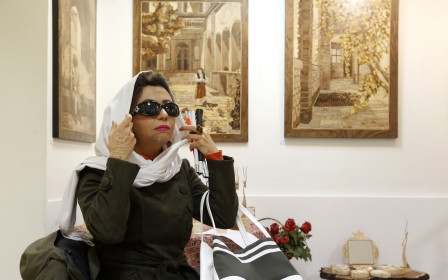Iran currency drops to record low after rebuke by UN nuclear watchdog

The Iranian rial currency fell to its lowest-ever rate against the US dollar on the unofficial market on Saturday, a day after Tehran's rebuke by the UN nuclear watchdog added to the pressure from US economic sanctions and the coronavirus pandemic.
The dollar was offered for as many as 193,300 rials, up from 188,200 rials on Friday, according to foreign exchange site Bonbast.com, which tracks the unofficial market. The economic daily Donya-e-Eqtesad gave the dollar rate as 190,800, Reuters reported.
New MEE newsletter: Jerusalem Dispatch
Sign up to get the latest insights and analysis on Israel-Palestine, alongside Turkey Unpacked and other MEE newsletters
The International Atomic Energy Agency's 35-nation board of governors called on Iran on Friday to stop denying it access to two suspected former nuclear sites, raising diplomatic pressure on Tehran.
The IAEA passed a resolution urging Tehran to provide inspectors access to two sites in Iran to help clarify whether undeclared nuclear activity took place there in the early 2000s. Iran has been blocking access to the sites for months, prompting a growing diplomatic row, AFP said.
President Donald Trump withdrew the US from a multilateral deal aimed at curbing Iran's nuclear programme in May 2018 and reimposed sanctions that have battered the economy.
A drop in oil prices and a slump in the global economy have deepened the economic crisis in the country, which is one of worst-hit by the coronavirus pandemic in the Middle East.
The real value of the foreign exchange is “definitely lower” than levels seen in the past few weeks and the central bank of Iran is trying to restore stability to the market, in part, by unblocking billions of dollars of frozen funds overseas, the central bank governor, Abdolnaser Hemmati, said in a note on Friday, according to Bloomberg News.
Hemmati also said the psychological impact of the IAEA resolution on the rial was exaggerated and that Iran's economy could cope with the added pressure.
"The circumstances created by corona, the temporary pressure on the foreign exchange market ...and the psychological atmosphere caused by the resolution of the IAEA Board of Governors should not give the wrong signal," Hemmati said in an Instagram posting.
"Despite the limited oil revenue, the country's foreign exchange balance is good and the central bank will continue to provide the needed currency... despite continued US pressure," he added.
Iran has accused Trump of blocking the country’s request for a $5bn loan from the International Monetary Fund to support its economy and health sector. Iran has been the Middle East’s hardest-hit nation by the pandemic, with 9,500 deaths in more than 200,000 positive cases so far, Bloomberg said.
Middle East Eye delivers independent and unrivalled coverage and analysis of the Middle East, North Africa and beyond. To learn more about republishing this content and the associated fees, please fill out this form. More about MEE can be found here.





